7th "ITB Hospitality Day" on security: Dangers are becoming increasingly dynamic
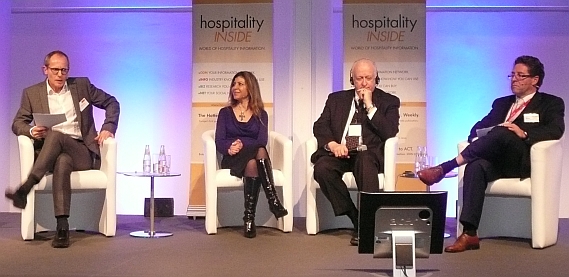 |
|
|
Experts in charge of security and being surprised by insecurity: (from left) moderator Peter Hinze, Mayar Abdel Aziz of Orascom Development in El Gouna/Egypt, Ed Fuller of Marriott, and Michael-W. Hartmann of Siemens. / photos (5): map |
Berlin (April 6, 2012). "Will holidays take place behind barbed wire in future?" asked Karl Born, former Chairman of TUI, already several years ago, and even Kempinski's CEO Reto Wittwer once described hotels as soft targets that were hard to protect. The journalist Peter Hinze pointed this out while hosting the panel on "Security: When a Holiday Turns into Chaos" at the 7th "ITB Hospitality Day" in Berlin several weeks ago. Ed Fuller, who was still President of Marriott International in March, cared for three Marriott Hotels after assassinations. Mayar Abdel Aziz of Orascom El Gouna experienced the "Arab Spring" herself, and Michael Hartmann, Siemens Hospitality expert, commented on the object of security and ongoing changes.
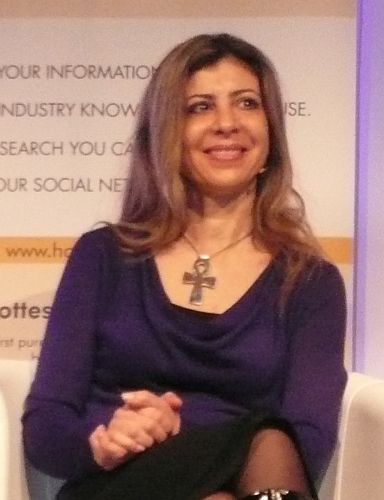 |
|
| Mayar Abdel Aziz. |
"Political unrest, crises, bombings. How do hotels protect their guests?" was the subtitle of this highly interesting, but only sparsely attended discussion panel at the ITB hotel conference. After last year's "Arab Spring", this question was even more explosive, and consequently, it quickly turned out that Egypt, at least for the time being, will remain on the highest of three levels of danger. Mayar Abdel Aziz, who is responsible for marketing the successful generic El Gouna resort and experienced the revolution herself, would also consider Sinai Peninsula an unsafe area, but not the resorts at the Red Sea. Cairo was a bit chaotic at the moment, displaying high police presence, "but the unrest is about domestic political power struggles and is not related to tourism in any way," she emphasizes.
"Threat levels become more dynamic over time," said Michael Hartmann, Senior Vice President Head Market Development Board Hospitality at Siemens AG, with reference to Egypt. Many incidents such as terrorist attacks on hotels were unforeseeable and thus not projectable.
Guests always expect security
Marriott's President, who has been retired since this week, confirmed this. Despite that, two bomb attacks on Marriott Jakarta and the collapsed Marriott World Trade Center proved to Ed Fuller that a destination which manages to maintain or regain the trust of travelers had always won. "As early as 30 years ago, Marriott started market research on safety, in the US at first, and later on abroad," he summarized. "The result was always: guests always expect 'safe' experiences."
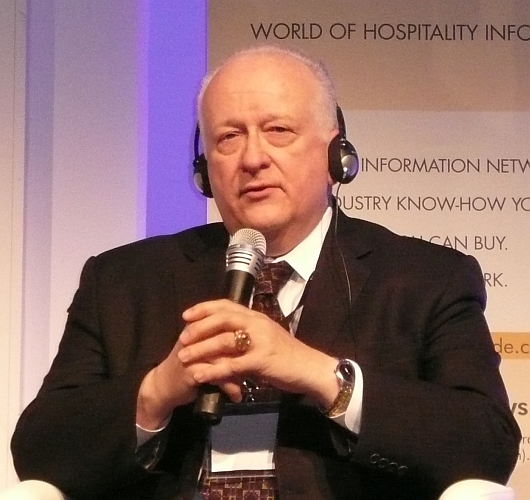 |
|
| Ed Fuller. |
For years now, Marriott has divided its regions with a total of 4,000 hotels into five security levels. These may even differ within the same country. This evaluation is carried out by dedicated Marriott specialists all over the world. "We develop our own individual safety precautions," said Fuller. Marriott's early development of safety standards has led to companies asking about them, before sending their employees to these hotels.
"The major American hotel brands have set high standards all across the world,even higher than officially required," praised the Siemens expert. But regarding the future, he has also noticed that hotels need to orient themselves differently: it was not the safety standards that were changing, but the environmental parameters. In future, cities would sound out their districts based on ever increasing security levels of regulative importance. "The hotel sector needs a voice," he warned with respect to the changing safety priorities Siemens sees, primarily regarding the quickly growing mega cities all over the world.
Safety can be bought
"Insecurity will not change," emphasised Ed Fuller as well, but he regretted that nobody made a distinction between terrorist threats and other insecurities, and also criticized the media as they often exaggerated in their coverage.
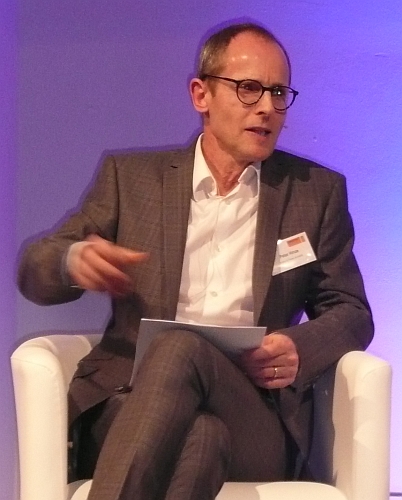 |
|
| Peter Hinze. |
Host Peter Hinze provided some food for thought: "There is only one 'safe haven' in the entire Arabian area: Dubai. Can safety be bought?" Hartmann's clear answer: "Yes." Safety can be strategically built up by investing lots of money: tapped phone calls are listened in on as soon as certain key terms appear, and underwater safety rings around the Palm islands were examples for both enormous and well-structured security efforts. Dubai that trusts in tourism to such a large degree "has no other choice than to massively increase security," he summarized.
But security must not only be restricted to guests. It should include employees and neighbourhoods as well, emphasized Mayar Abdel Aziz. In El Gouna, with its 22,000 inhabitants or tourists, there is a series of security systems (videos, cameras, guards, dogs), "but you need to handle them flexibly."
Security oases are the future
Of course, vacationers feel more comfortable when there are no such things as security screenings and technical surveillance in the hotel lobby, while companies would send their employees solely to so-called "security oases". Hinze's question whether these oases were safe hotels of the future was answered by Ed Fuller with yes, as far as business travelers are concerned.
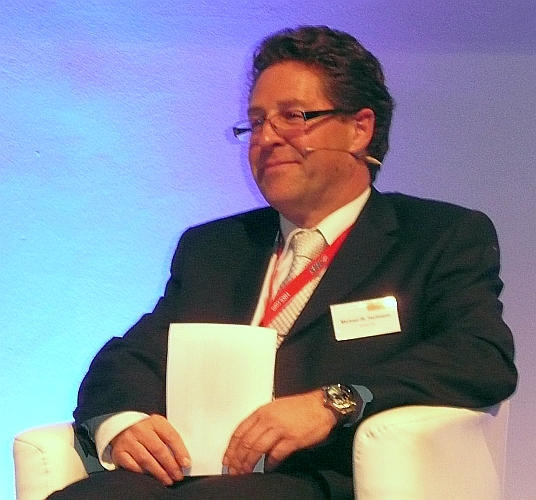 |
|
| Michael W. Hartmann. |
Last but not least, Fuller, who has great experience with crises, pleaded not to forget about the employees and care for them just as intensely as for the guests. Accordingly, Marriott flew out both guests and employees from its threatened hotel in Tripolis at its own expense without waiting for the support of the local government. "Employees know their responsibility towards their guests," praised Fuller. "In Thailand, a restaurateur saw the tsunami coming and fetched the guests from the beach."
At the end, Michael Hartmann advised the hotel industry to establish various processes for different types of emergencies ranging from fire alarms to tourist attacks. Security systems should support employee training in this respect. The final word was short and true: "We live in constant latent danger nowadays." / Maria Puetz-Willems
Continuative Links:
- Summaries and videos of all panels of ITB Hospitality Day 2012
- March 30, 2012 Strong brand or no brand: 7th ITB Hospitality Day on
- March 23, 2012 I love this company:
- March 16, 2012 Battle for online dominance: ITB distribution panel: Which portals will fall by the wayside?
To print this article you have to be registered and logged in for newsletter, visitor or subscription.





